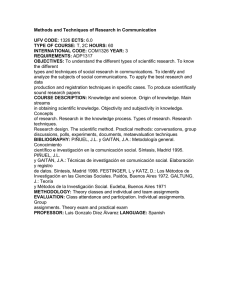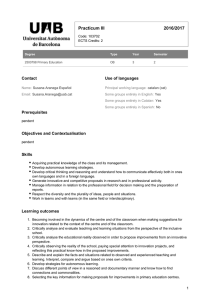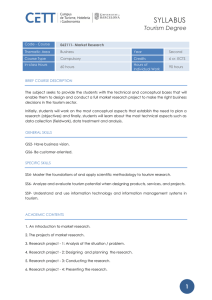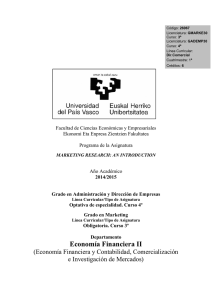Educational Research
Anuncio
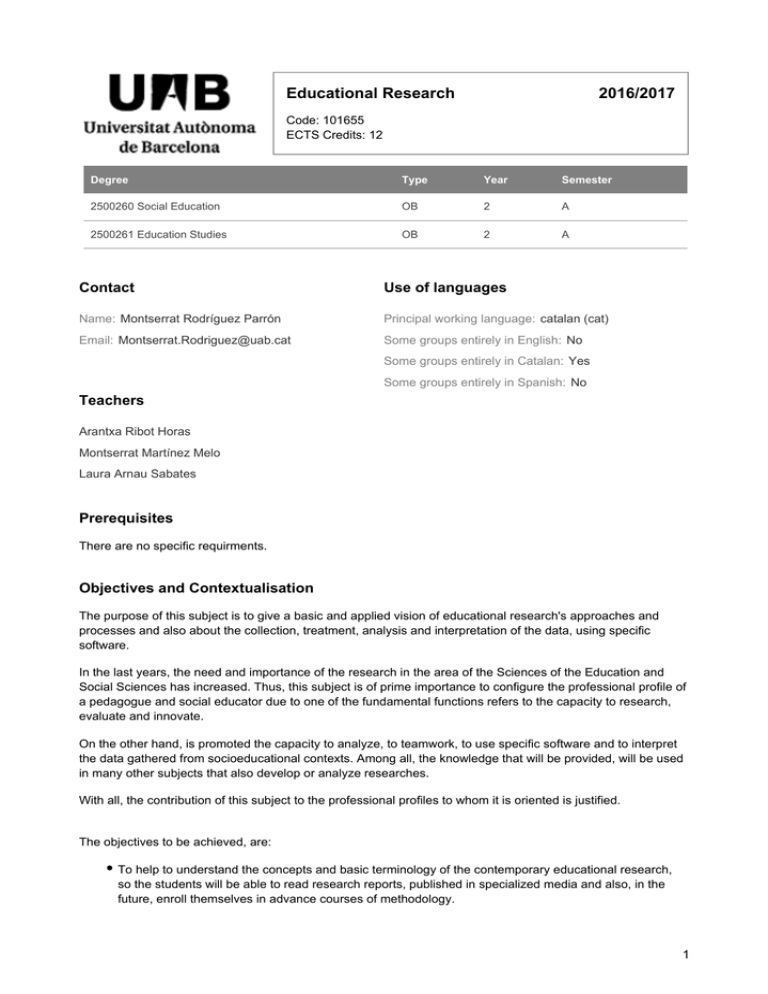
Educational Research 2016/2017 Code: 101655 ECTS Credits: 12 Degree Type Year Semester 2500260 Social Education OB 2 A 2500261 Education Studies OB 2 A Contact Use of languages Name: Montserrat Rodríguez Parrón Principal working language: catalan (cat) Email: [email protected] Some groups entirely in English: No Some groups entirely in Catalan: Yes Some groups entirely in Spanish: No Teachers Arantxa Ribot Horas Montserrat Martínez Melo Laura Arnau Sabates Prerequisites There are no specific requirments. Objectives and Contextualisation The purpose of this subject is to give a basic and applied vision of educational research's approaches and processes and also about the collection, treatment, analysis and interpretation of the data, using specific software. In the last years, the need and importance of the research in the area of the Sciences of the Education and Social Sciences has increased. Thus, this subject is of prime importance to configure the professional profile of a pedagogue and social educator due to one of the fundamental functions refers to the capacity to research, evaluate and innovate. On the other hand, is promoted the capacity to analyze, to teamwork, to use specific software and to interpret the data gathered from socioeducational contexts. Among all, the knowledge that will be provided, will be used in many other subjects that also develop or analyze researches. With all, the contribution of this subject to the professional profiles to whom it is oriented is justified. The objectives to be achieved, are: To help to understand the concepts and basic terminology of the contemporary educational research, so the students will be able to read research reports, published in specialized media and also, in the future, enroll themselves in advance courses of methodology. To develop a positive, critic and plural attitude toward the research as a tool to comprehend and 1 To develop a positive, critic and plural attitude toward the research as a tool to comprehend and improve the educational reality. To know and understand the main characteristics of the most common research methods applied in the educational field. To assess the advantages and limitations of quantitative, qualitative and mixt approaches. To learn the basic characteristics of a research work. To develop a wide range of skills and procedures to collect, analyze and interpret data. Identify the main software to analyze data. Skills Social Education Develop critical thought and reasoning and be able to communicate them effectively, both in your own language and second or third languages. Generate innovative and competitive proposals in research and professional activity. Know and apply information collection, analysis, processing and evaluation processes, to improve professional practice itself and the foundation of professional action. Education Studies Develop critical thinking and reasoning and know how to communicate effectively both in your own tongues and in other languages. Foster improvement process on the basis of the results of research or needs assessment processes. Generate innovative and competitive proposals in research and professional activity. Identify educational approaches and problems, inquire about them: obtain, record, process and interpret relevant information to issue supported judgments that enhance education and training. Manage information related to the professional environment for decision-making and reporting. Learning outcomes 1. Assessing the strengths and weaknesses of research (reports, articles) based on their sections. 2. Design quantitative and qualitative descriptive studies based on given problems or needs. 3. Develop descriptive studies by producing strategies and tools to obtain and record quantitative and qualitative information. 4. Identifying the methodological perspectives of the research analysed. 5. Produce reports based on results received 6. Properly formulate research problems and hypotheses in real or simulated contexts. 7. Proposing improvements based on studies or published research. 8. Relating research results with processes of innovation. Content BLOCK A (4 ECTS) Construction and development of scientific knowledge in education. Research epistemology and methodology: Education as a scientific knowledge. Research process in education. Paradigms in educational research. Research methods and design: quantitative, qualitative and mixed. BLOCK B (8 ECTS) Techniques and tools of quantitative and qualitative data collection and registration. Main tools to register information. Main tools to collect data. Construction and validation of instruments. Qualitative analysis of socioeducational variables: 2 Qualitative research characteristics. Models of data analysis. Qualitative data analysis research processes. Qualitative data analysis software. Quantitative analysis of socioeducational variables: Quantitative data analysis software. Socioeducational variables: characteristics and measurement. Role of statistics in scientific research. Descriptive statistics of categorical variables. Descriptive statistics of quantitative variables. Bivariate analysis. Introduction to statistical inference. Methodology In-class: Exposure by the professor of the content and the main aspects of the program. These sessions are developed with all the class group and allow the exposure of the principal content through active and open participation of the student. Seminars and lab practices: Working spaces with reduced groups (1/3 of the whole group) supervised by the professor. Through the data analysis, the analysis of documents, case studies and various activities, the students will examine in depth the contents approached in in-class sessions. Evaluation activities: Activities to verify and grade the achievements through the works and tests. Autonomous activities: Self-managed activities to acquire competencies through a self-regulated learning. Activities Title Hours ECTS Learning outcomes Large group 60 2.4 2, 5, 6, 4, 1 Seminars and Laboratory 30 1.2 3, 2, 5, 8 60 2.4 3, 2, 5, 7 150 6 2, 5, 6, 7 Type: Directed Type: Supervised Activities supervised Type: Autonomous Activity autonomy Evaluation To pass the subject the minimum final grade of each block will be no less than 5. The final grade will be the calculation of the weighted mean of each block (block A and block B). 3 The final grade will be the calculation of the weighted mean of each block (block A and block B). Regarding the block A, the minimum grade must be a 5. The minimum grade of every assignment to form average is 5. Regarding the block B, the minimum grade must be a 5. The minimum grade of every assignment to form average is 5. Regarding the final work, the grade must be 5 and it is not re-assessable. The students who along the subject have been doing a continuous work, and even though, still have an under 5 graded block, will have the chance to be re-assessed within the course period. The activities, practices and study cases will be distributed along the subject. Each will be temporized with a submittion deadline. The feedback and monitoring of the activities will be up to a month. In case any student is willing to review the grade, would have to do so within the following 15 days after the feedback, in tutoring time. It is needed to submit every activity proposed by the professor, it is a mandatory requirement to be assessed. Total or partial plagiarism of any exercises, work, practices or tests will be considered "fail" of the subject. The class attendance is mandatory: the student has to attend at a minimum of 80% of the sessions. Otherwise, will be grade as a "non submitted". It is needed to have a teaching-like attitude to pass the subject. Some of the competences could be: avtive listening, respect, cooperation, empathy, punctuality, non judging attitude, argumentation, appropriate us of the cellphone. Evaluation activities Title Weighting Hours ECTS Learning outcomes PART 1. THEORY. Control of the agenda of Block A 10% 0 0 2, 6, 4, 1 PART 1. THEORY. Control of the agenda of Block B 30% 0 0 3, 2, 5, 7, 8, 1 PART 2. PRACTICE. Compilation of the practices in Block A 10% 0 0 2, 5, 6, 4 PART 2. PRACTICE. Compilation of the practices in Block B 30% 0 0 3, 2, 5 PART 2. Working group that was developing throughout the academic year referred to Blocks A and B 20% 0 0 3, 2, 5, 6, 8 Bibliography Metodologia Albert, M.J. (2007). La investigación Educativa. Madrid:McGraw Hill APA (2009). Publication Manual of American Psychological Association (Sixth Edition). Washington, DC: APA Arnal, J.; del Rincón, D.; Latorre, A. (1992). Investigación educativa: fundamentos y metodología. Barcelona: Labor Arnau, L. (2014). La recerca en la pràctica professional de la Mediació. A, X Moreno (Ed.), Bases de Mediació (pp. 79-89). Barcelona: Servei de Publicacions UAB Alvira Martín, Francisco (2004). La encuesta: una perspectiva general metodológica. CIS. Cuadernos 4 Alvira Martín, Francisco (2004). La encuesta: una perspectiva general metodológica. CIS. Cuadernos Metodológicos Azofra Marquez, Mª José (1999) Cuestionarios. CIS. Cuadernos Metodológicos. Bisquerra, R. (coord.) (2004), Metodología de la Investigación Educativa. Madrid: La Muralla Bryman, A. (2004), Social research methods. 2nd ed. Oxford: Oxford University Press Cohen, M., Manion, L. (2002), Métodos de investigación educativa. Madrid: La Muralla Corbetta, P. (2007). Metodología y Técnicas de Investigación Social. Madrid: McGraw-Hill Del Rincón, D. ; et al. (1995). Técnicas de Investigación en Ciencias Sociales. Madrid: Dykinson. Garcia Ferrando, Manuel (1994). Socioestadística. Introducción a la estadística en sociología. 2a edició amp. Madrid: Alianza. Alianza Universidad Textos, 96 Gordo, A.J.; Serrano, A. (Coord.) (2008) Estrategias y prácticas cualitativas de investigación social.Madrid. Pearso. Prentice Hall. Hernández, R.; Fernández, C.; Baptista, P. (2003). Metodología de la investigación. 3ª ed. Méjico, D.F.: McGraw-Hill Hernández, R.; Fernández, C.; Baptista, P. (2007). Fundamentos de metdología de la investigación. Madrid. McGraw-Hill Jariot, M. (2010). L'anàlisi quantitativa. En Jariot, M.; Merino, R.; Sala, J. (coords). Les pràctiques d'educació social. Eines per al seu desenvolupament. (pp 143-152). Col. Materials. Bellaterra: Servei de publicacions UAB Jariot, M. (2010). El qüestionari. En Jariot, M.; Merino, R.; Sala, J. (coords). Les pràctiques d'educació social. Eines per al seu desenvolupament. (pp 127-133). Col. Materials. Bellaterra: Servei de publicacions UAB Latorre, A., del Rincón, D., Arnal, J. (2003), Bases metodológicas de la investigación educativa. Publicació Barcelona: Experiencia Leon, O.; Montero, I. (2002). Métodos de investigación en Psicología y Educación. Madrid: McGraw-Hill. López Roldán P, Lozares Colina C (1999). Anàlisi bivariable de dades estadístiques. Univ. Autònoma de Barcelona López Roldán P, Lozares Colina C (2000). Anàlisi multivariable de dades estadístiques. Univ. Autònoma de Barcelona. McMillan, J.H.; Schumacher, S.(2005). Investigación Educativa. 5ª ed. Madrid: Pearson-Addison Wesley. McMillan, J.H.; Schumacher, S. (2010). Research in education: evidence-based inquiry. 7th ed. Boston: Pearson Mertens, D.M. (2010). Research and Evaluation in Education and Psychology (Third Edition). California: SAGE Publications. Quivy, R.; Van Campenhoudt, L. (1999). Manual de investigación en ciencias sociales. Méjico: Limusa Rodríguez Parrón, M. (2010). L'observació. En Jariot, M.; Merino, R.; Sala,J. (coords). Les pràctiques d'educació social. Eines per al seu desenvolupament. (pp 117-120). Col. Materials. Bellaterra: Servei de publicacions UAB 5 Rodríguez Parrón, M. (2010). L'entrevista. En Jariot, M.; Merino, R.; Sala, J. (coords). Les pràctiques d'educació social. Eines per al seu desenvolupament. (pp 121-126). Col. Materials. Bellaterra: Servei de publicacions UAB Rodríguez Parrón, M. (2015). L'observació de la interacció. En Feixas, M.;Jariot, M.;Tomàs-Folch, M. (coords.). El pràcticum de pedagogia i educació social. (pp. 153-164). Col.Materials. Bellaterra: Servei publicacions UAB Sánchez Carrión, J. J. (1995). Manual de análisis de datos. Madrid: Alianza. Sandín, M.P. (2003). Investigación cualitativa en educación. Madrid: McGraw Hill. Van Manen, M. (2003): Investigación educativa y experiencia vivida, Barcelona,Idea Books. Stevens S S (ed.) (1951) Handbook of Experimental Psychology.Wiley, New York Anàlisi de dades Botella et al.(2001). Anàlisis de datos en Psicología I. Madrid. Piràmide. Gil, J., Diego, J.L., García, E., & Rodríguez, G. (1997). Estadística básica aplicada a las ciencias de la educación. Sevilla: Kronos. Gil, J., Diego, J.L., García, E., & Rodríguez, G. (1997). Problemas de estadística aplicada a las ciencias de la educación. Sevilla: Kronos. Hair, J.F.; Anderson, R.E.; Tatham, R.L.; Black, W.C. (1999). Análisis multivariante. Prentice-Hall. Levy, J.P.; Valera, J. (2003). Análisis multivariado para ciencias sociales. Madrid: Prentice-Hall. Pardo, A.; Ruiz, M.A. (2005). Anàlisis de datos con SPSS 13. Madrid. Mc Graw Hill. Pardo, A.; San Martín, R. (2004). Anàlisisde datos en Psicología II. Madrid. Piràmide. Perez Juste, R. et al. (2009). Estadística aplicada a la educación. Madrid: Pearson. Ritchey, F.J.(2006). Estadística para las ciencias sociales. Méjico: McGraw Hill. Rodríguez Parrón, M. (2010). L'anàlisi qualitativa. En Jariot, M.; Merino, R.; Sala, J. (coords). Les pràctiques d'educació social. Eines per al seu desenvolupament. (pp 153-159). Col. Materials. Bellaterra: Servei de publicacions UAB Throughout the course teachers offer students books, articles and other documents to expand and / or deepen the different topics. 6
